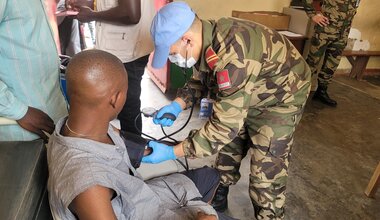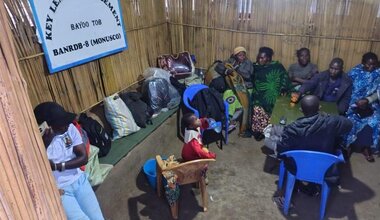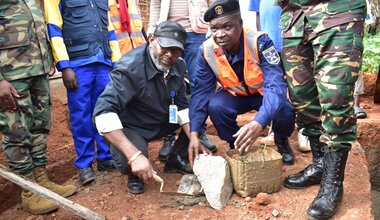Major Thobeka Mswane, a female peacekeeper from South Africa, committed to make DRC a safer place for women and children.
In the depths of north-eastern Democratic Republic of the Congo, west of the biologically diverse Virunga National Park, in Beni, South African peacekeepers stood to attention. While flags flew high in the cool breeze, and clay dust settled beneath the wings of the newly arrived airplane, a sense of African solidarity filled the air.
Walking up the steps from the runway to MONUSCO’s Republic of South Africa Battalion base, the visitors from Kinshasa were greeted with salutes of peacekeepers: the formality of the occasion quickly softening with a warm smile and handshake from the Special Representative of the Secretary-General (SRSG), Ms Bintou Keita.
Shaking the hand of the SRSG was a female peacekeeper whose smile reflected a unique sense of gratitude and a deep presence in the moment. Her name: Major Felicia Thobeka Mswane, the Fire Support Coordinator for the Force Intervention Brigade.
Major Thobeka was coming to the end of her year in service to the people of the DRC, having been responsible for coordinating fire support during operations and ensuring the safety of all those involved in the operations. An immense responsibility, Major Thobeka expressed her passion for her work; “UN Peacekeeping helps countries navigate the difficult path from conflict to peace. My decision to volunteer to serve as a UN Peacekeeper comes from the love to serve my country and to assist in Peacekeeping tasks, knowing that my country has invested in me skills to perform inside the military and individually in organizations like the UN.”
It is with this passion, support from her battalion and that of the organization, that Major Thobeka overcame the challenges that face female peacekeepers: “The military, as an organization, is male dominated,” she said, “[Some] countries do not have female commanders in the Fighting Corps: I was the only female soldier deployed with males in [some instances], making access to limited accommodation and ablution facilities difficult.”
Major Thobeka stated that, however, “the UN acknowledges female peacekeepers and puts in place all necessary support for them, [as are] Commanders always assisting to their best ability.”
As of December 2021, women constitute 7.8 percent of all uniformed military, police, justice, and corrections personnel in United Nations field missions. Women are essential to peacekeeping: they have greater access to communities through women and children, they hold diverse sets of skills in planning and decision-making and encourage women to become a part of peace and political processes.
“Having had the opportunity to deploy on the ground, [I saw that] having females in military teams makes it easier for women and children to feel safe and trust the UN, which works to protect women and children. In times of unrest and conflict, military set ups provided by the UN in the DRC become safe havens for women and children,” Major Mswane stated.
Working in volatile situations, peacekeepers, as ordinary people, can achieve extraordinary things, often leaning on the support of their loved ones, which meant for Major Thobeka, “serving and engaging with the communities of the DRC and listening intently to them has been my greatest achievement, [along with] having completed my tour of duty with no friendly fires.” “I would not have done it without the support of my family: from my siblings to my mother [and] my ten-year-old son, who sent me a message of support every morning,” she continued.
The UN is working to ensure the deployment of more women in uniformed functions through the Women, Peace and Security Agenda, the UN Security Council resolution 1325 (UNSCR1325), which advocates for the equal participation of women in all sectors of peacekeeping operations, and the Action for Peacekeeping (A4P) Declaration of Shared Commitments, through which the UN has called for an expansion of the role and contribution of women in its operations. However, the responsibility for the deployment of women in the police and military ultimately lies with the willingness and proactivity of Member States.
 UN
UN United Nations Peacekeeping
United Nations Peacekeeping






